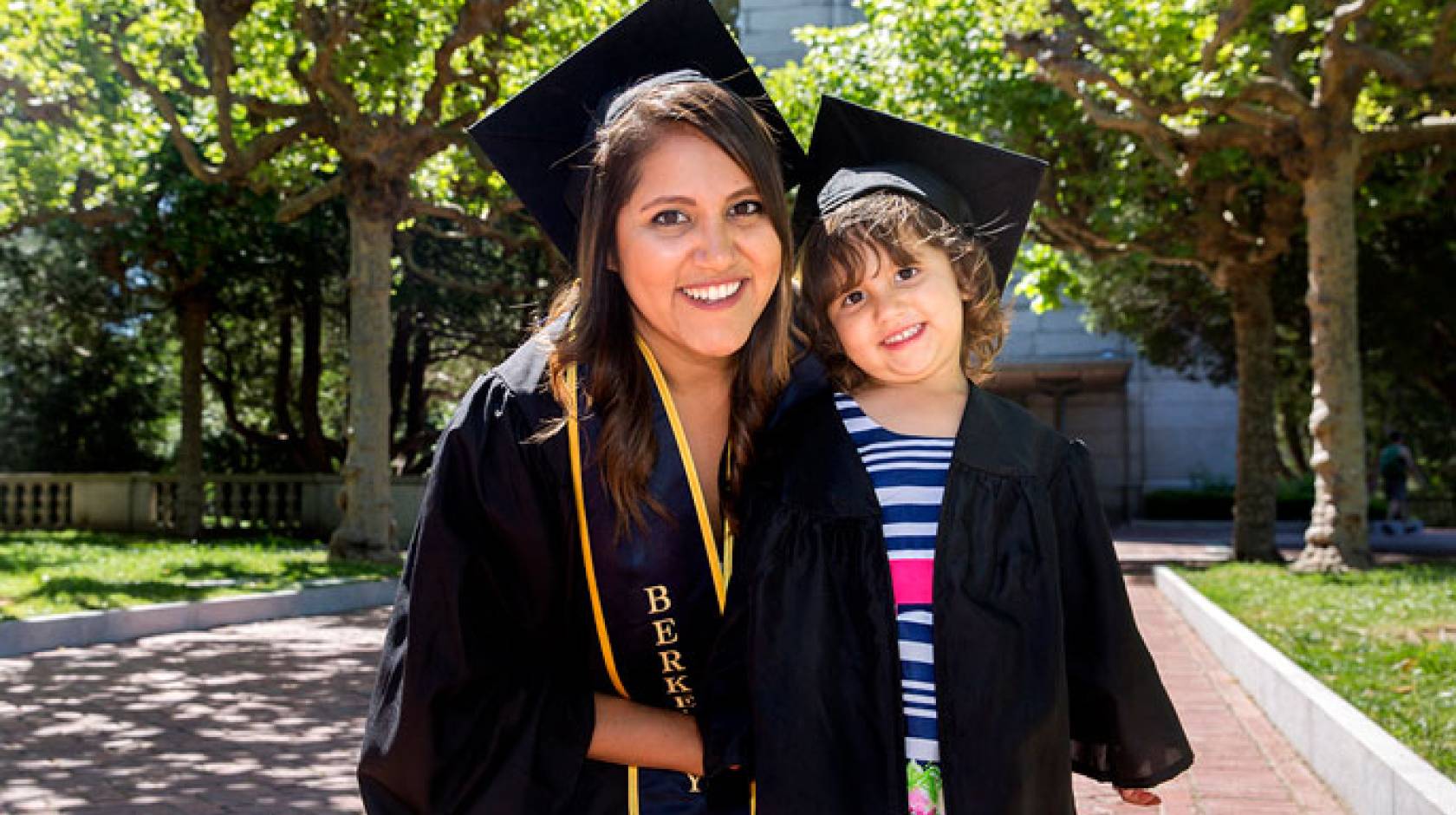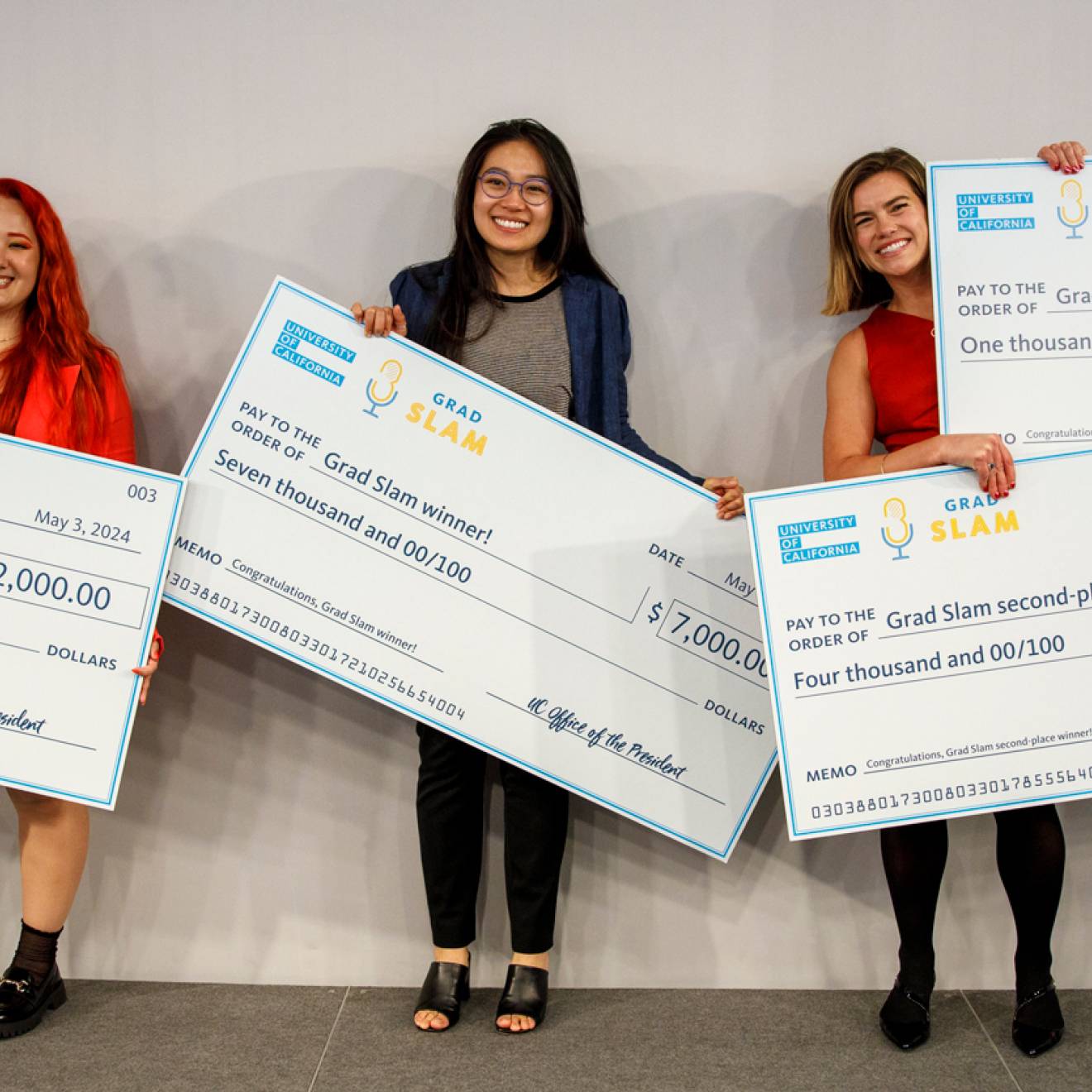Gretchen Kell, UC Berkeley

Majoring in sociology, studying abroad, joining student clubs, even learning to salsa dance. Natalie Ruiz was eager to see how much she could pack into two years at UC Berkeley when she arrived as a transfer student in fall 2013.
Then, three weeks into first semester, 21-year-old Ruiz discovered she was pregnant. “My first thought was, ‘I’m going to drop out; there’s no way I can do school pregnant and with a child,’ ” she says. “I couldn’t envision my graduation from Berkeley anymore.”
But this Sunday, May 14, Ruiz, now 25, will receive her diploma from the Department of Sociology, her 3-year-old daughter, Clara, beside her. Not only will she graduate with high honors and a 3.97 GPA, but she’ll give her department’s undergraduate commencement speech.
Later that same day, Ruiz, who wound up also majoring in social welfare, will attend a second ceremony. The School of Social Welfare is awarding her its highest honors and the Social Welfare Dean’s Award for Community Service.
In addition to juggling motherhood and two majors while at Berkeley, Ruiz was a legislative intern in the Cal-in-Sacramento program, completed a year-long senior honors thesis research project and raised $50,000 for a student-parent food-donation program. For her food security work at SPARR, Ruiz just received from UC President Janet Napolitano a 2017 President’s Award for Outstanding Student Leadership.

Credit: Brittany Hosea-Small/UC Berkeley
Even more remarkable, though, is Ruiz’s refusal while at Berkeley to be set back by a wave of additional challenges, including surgery for severe acute necrotizing pancreatitis. She was in the hospital for a month and wore a feeding tube, including at school, for half a year.
“Becoming unexpectedly pregnant just scratched the surface for Natalie, but she found a way to work through it to succeed,” says Luke Blanchard, a 2014 Haas School of Business graduate, Ruiz’s partner since high school and Clara’s father. “Did I ever think she’d give up? No, never. She isn’t a quitter. And she wasn’t alone.”
“There were some really scary moments where we were wondering how to make this all work,” says Ruiz’s cousin, Samanta Cubias, who lives in Oakland and was Clara’s frequent babysitter. “But we did it. Sí, se puede.”
A community welcomes her
The daughter of first-generation college students, Ruiz says “it was made very, very clear to me that education is a privilege, and you take every advantage of it.” In her last year at Solano Community College in Vacaville, she applied to nursing schools — “I had a vague goal; I just wanted to help people,” she says — but also to Berkeley, where she’d been denied admission as a freshman.
This time, she was accepted only to Berkeley, and chose to study sociology.
But after becoming pregnant, Ruiz doubted herself and felt self-conscious. She worried other Berkeley students wouldn’t accept her as a friend and felt her father pull away, disappointed, she says, “because I was pregnant and he thought I wasn’t going to finish school, and because I wasn’t getting married.”
“My dad is at peace with things now, and he is proud of me,” says Ruiz. “But back then, he was ashamed of me and didn’t want me to come home. I felt I had let him down.”

Credit: Brittany Hosea-Small/UC Berkeley
Things began to look up when Ruiz’s Unit 2 residence hall adviser referred her to the Student Parent Center in the César E. Chávez Student Center. There, director Ginelle Perez welcomed Ruiz to a place where student parents get advice, nurse babies, change diapers, study together, form friendships and share setbacks and achievements.
“Ginelle smiled at me and gave me a hug… She knew how much this was all going to be OK, that I didn’t need to cry,” Ruiz says. Perez introduced her to other student parents and told Ruiz of resources including a parent grant, a reduced course load, family housing and information on readmission, if she chose to withdraw from school until after she gave birth.
“My message to parents and parents-to-be,” says Perez, “is always that you don’t have to give up your Berkeley dream.”
The promise of light
Sociology lecturer Szonja Ivester says Ruiz, in her Sociology 121 class in fall 2013, was “the it student. The one that I want in every class I teach.” She admired Ruiz’s “razor-sharp brainpower, and how she contributed to our class discussions and asked critical, but kind and respectful, questions. Her natural leadership abilities also kicked into high gear.”
In January 2014, Ruiz suffered excruciating pain in her back. “I’d be fine one moment,” she says, “and then the spasms would get so intense that I was on the floor.” Between January and May, in the second trimester of her pregnancy, Ruiz was in and out of the hospital five times, all while carrying a full course load and earning top grades. Doctors could not find the cause.
No longer in Unit 2, her living situation was unstable. Rental housing was too expensive, so Ruiz sometimes stayed with Blanchard, or in Oakland with cousins, or with her mom in Vacaville. To avoid paying to park on campus, she’d leave her car near BART to get to school, but grew nauseous on the train.

Credit: Brittany Hosea-Small/UC Berkeley
Doe Library’s North Reading Room became Ruiz’s haven. “It was one of the few quiet places where I felt I could focus,” she says. “That season of my life was extremely dark; I didn’t know if I’d make it to graduation, or how I could possibly raise a baby at this time.”
One day at the library, she noticed light shining down on her growing belly, right over the university seal on her T-shirt and the words “fiat lux.” She and Blanchard had considered Lillian or Clara as baby names, but now the choice was made.
“I felt my daughter kick, and it occurred to me that clara in Spanish means ‘bright,’ and I imagined the way that this baby could and would be the bright light at the end of this dark season,” says Ruiz, who gave birth to Clara on May 15, 2014.
Champion of perseverance
That summer, Ruiz had emergency surgery. Two-thirds of her pancreas, as well as her gall bladder and spleen — all infected and no longer functioning — were removed. She spent a month in the hospital. Her gastrointestinal tract was so damaged she couldn’t digest food and was on a feeding tube from July through December.
Ruiz canceled summer school and moved home, where family and friends took turns caring for her and the baby. She returned to Berkeley in fall 2014 with a full course load and a liquid food supply in her backpack, tubes running from it into her large intestine. Unable to lift or feed her daughter, she commuted half the semester from Vacaville, with help from her mom, then moved with Blanchard to family housing in University Village.

Credit: Brittany Hosea-Small/UC Berkeley
“Not even feeding tubes could keep her away from the classroom,” says Ivester. “Natalie thinks of being a student as some kind of awesome; she inhales every class, every reading, every office hour, every conversation.”
In 2015, as Ruiz’s health returned, she found a new calling, the result both of her experiences as a new parent who endured “demoralizing, sometimes inefficient” situations when applying for benefits from government entitlement programs, she says, and as an intern with Alameda County Social Services who interacted with Medi-Cal, CalWORKS and CalFresh clients.
“There is a disconnect between entities deciphering social problems and the government and nonprofit agencies providing services and solutions,” she says. “I am motivated to do work, to conduct in-depth, qualitative research, to help bridge that gap.”
On campus, Ruiz added social welfare as a second major and worked as a peer resource counselor at the Student Parent Center, an undergraduate research assistant in the Department of Sociology and a tutor at San Quentin State Prison through the DeCal “Teach in Prison” course.

Credit: Brittany Hosea-Small/UC Berkeley
Ruiz also became SPARR’s food donation program director, organizing nonprofit pickup and distribution of grocery donations, fundraising, grant writing and elevating the level of support the group gives to more than 100 student parent households struggling with food insecurity.
In summer 2016, as a legislative intern for state Sen. Hannah-Beth Jackson in Sacramento, Ruiz noticed the importance of “well-founded scientific research” to politicians’ decision-making. This past school year, her honors thesis explored the shortcomings of a bureaucratically-organized financial aid system and how it impacts college students with children.
Having arrived at Berkeley unexpectedly expecting and with only a vague idea about a career serving others, Ruiz says it was “becoming a mom that made me realize the people I want to help are poor families, especially poor mothers. I will graduate from Cal prepared to be their advocate through policy, government or nonprofit work.”
“Her daughter,” adds Ivester, “is the luckiest child in the world. I mean, wouldn’t it be great to have a role model like Natalie around every day?”

